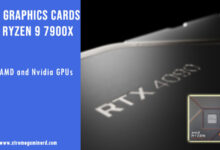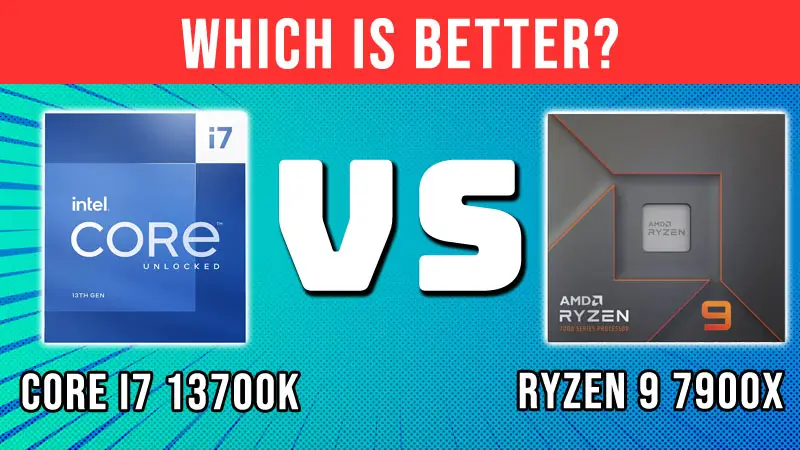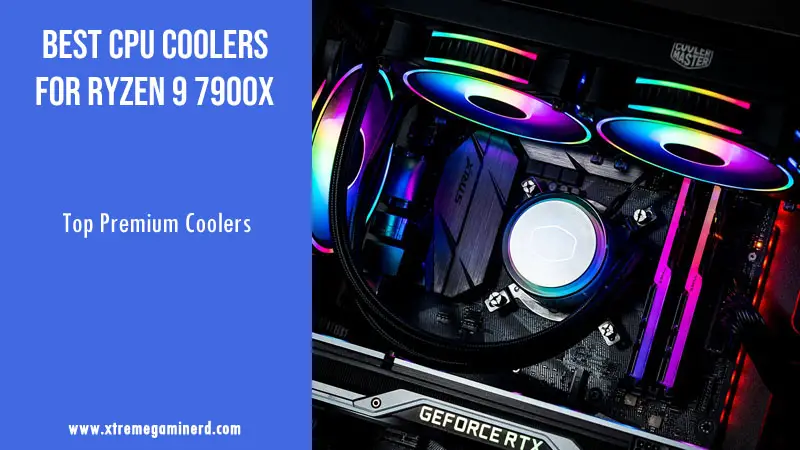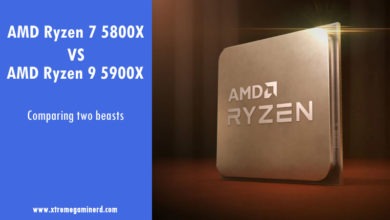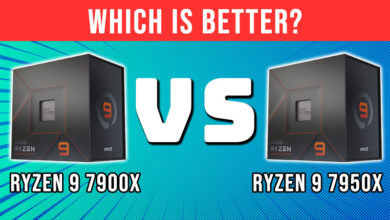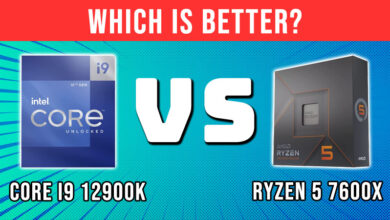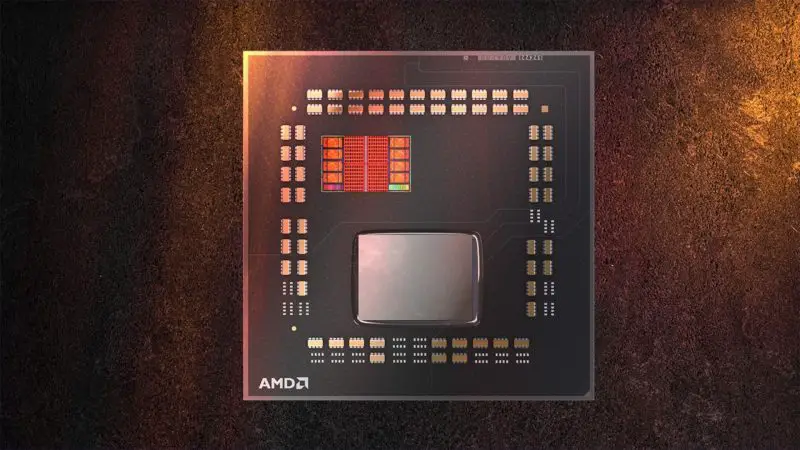Ryzen 9 processors have been at the top of the charts for multi-threaded operations and while they are also capable of high-end gaming performance, most users opt for them for productivity or content creation.
This leads to more competition today where we have multiple generations of Ryzen CPUs each having a few Ryzen 9 CPUs that can be compared to each other to see which one is faster.
Today, we are looking at the latest Ryzen 9 7900X going against the Ryzen 9 5900X from the Vermeer family. Ryzen 7000 CPUs are already looking solid and if you are looking to upgrade or build a blazing-fast computer, you should check out what you are going to get with the 7900X over the 5900X and what potential disadvantages you might be seeing.
Specifications Difference
SPECS | AMD RYZEN 9 7900X | AMD RYZEN 9 5900X |
Code Name | Raphael | Vermeer |
Lithography | 5nm | 7nm |
Socket | AM5 | AM4 |
Cores/Threads | 12/24 | 12/24 |
Clock Speeds | 4.7/5.6GHz | 3.7/4.8GHz |
L2/L3 Cache | 12/64MB | 6/64MB |
TDP | 170W | 105W |
Integrated Graphics | Yes | No |
If we start by comparing them in specifications, the 7900X is definitely ahead of the 5900X in many areas. However, there are still no improvements in the core and thread count which have been the case with almost every Ryzen CPU and their successors starting from the very first generation to the current one.
The 7900X is almost 1GHz faster than the 5900X in both base and boost clock speed which is insane and among the most significant improvements, AMD made on the 7000 series. The L2 cache size is also doubled from 6MB to 12MB but the L3 cache remains the same at 64MB.
L2 cache is generally faster but L3 cache is also crucial to high performance. Apart from these obvious specs differences, we have changes in the architecture, compatibility, and features that we are going to see in the next sections.
Architectural Difference
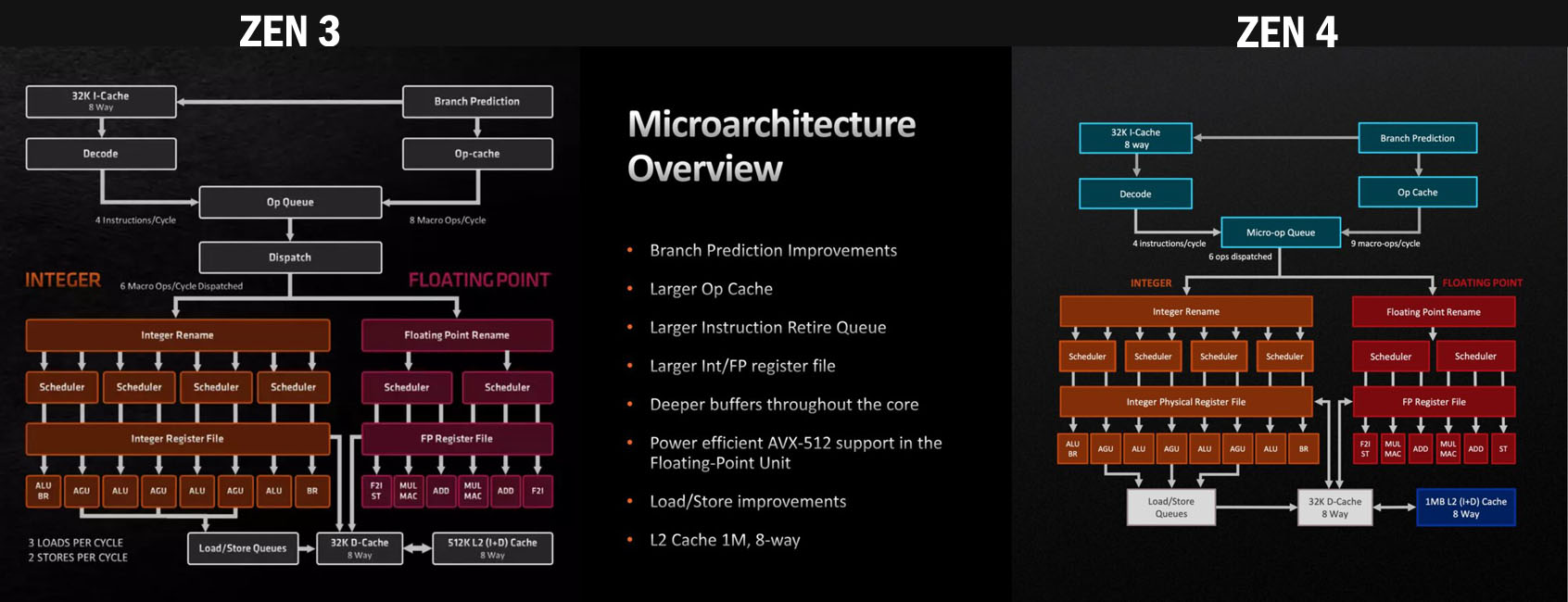
Advanced architectural improvements are not easy to understand but you should understand what are some crucial changes that make a difference. AMD has been improvising its Zen architecture since the first time it launched the Ryzen 1000 series in 2017 and we have come here to a point where significant improvements made in each generation result in at least 15-20% performance growth.
The Ryzen 7900X is based on Zen 4 while the 5900X uses the Zen 3 architecture. Both have many similarities as Zen 4 is not made from scratch but instead enhances the architectural design in many ways. It includes improvements made in Front End, Execution Engine, and Load Store Advances. This results in an overall IPC uplift of up to 13% which is not bad but lower than the IPC improvement between the Zen 2 and Zen 3.
The 7900X comes with four cores per CCX(Core Complex) and two CCX per CCD(Core Compute Die) unlike the 5900X which uses one CCX per CCD or eight cores per CCX or CCD. As both the 7900X and 5900X come with 12 cores, there are two CCDs present on each chip with one core disabled per CCX or CCD.
Despite having two CCX per CCD in Zen 4, the 7900X is able to utilize all the 32MB L3 cache by 6 cores in each CCD just like the 5900X. As Zen 4 processors are made on a 5nm process node compared to 7nm on the 5900X, the 7900X features roughly 57% more transistors closely packed for better efficiency and smaller die size.
- The world's best gaming desktop processor, with 12...
- Can deliver elite 100+ FPS performance in the...
- Cooler not included, high-performance cooler...
- 4.8 GHz Max Boost, unlocked for overclocking, 70...
Motherboard Compatibility
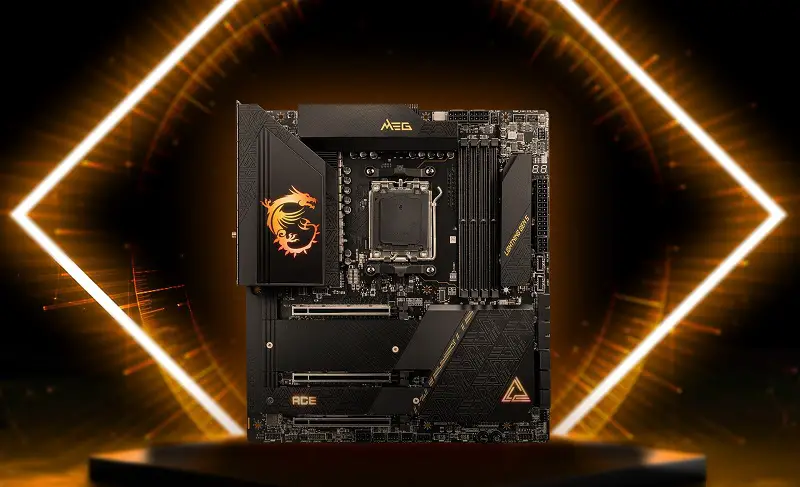
Ryzen 7900X is compatible with the AM5 socket whereas the 5900X is compatible with the AM4 socket. These cannot be interchanged on either of the sockets and therefore the AM5 socket is also incompatible with all the previous gen Ryzen processors.
AM5 is a completely different socket then we used to have till now from AMD. This is because AM4 and most of the previous sockets like FM2 and AM3 are PGA(Pin Grid Array) sockets, however, AM5 is an LGA(Land Grid Array) socket which is the most common type of Intel socket.
The AM5 socket consists of pins instead of the pins on the processor whereas AM4 has pin holes and the 5900X or any other AM4-compatible processor has pins on the chip itself.
AM4 has the advantage of having a large number of chipsets that includes all the nine 300, 400, and 500 chipsets from the previous generations whereas AM5 currently has a total of only four. These four chipsets in reality come down to only two whereas the other two are equipped with the “Extreme: feature that provides more PCI-E 5.0 lanes. Rest remains the same.
RAM Compatibility
Ryzen 7900X and 5900X belong to different generations and are compatible with different sockets. AM4 motherboards can only support DDR4 memories, hence, the 5900X can only support DDR4 RAM type.
The AM5 socket, on the other hand, supports only DDR5 RAM out of the box and doesn’t support DDR4 at all. This makes 7900X only compatible with DDR5 RAM.
DDR5 RAM is significantly faster in clock speeds than DDR4 but also brings higher latency timings. Apparently, they both look identical in terms of pin layout but the cutout is a little shifted toward the other side on DDR4.
Integrated Graphics
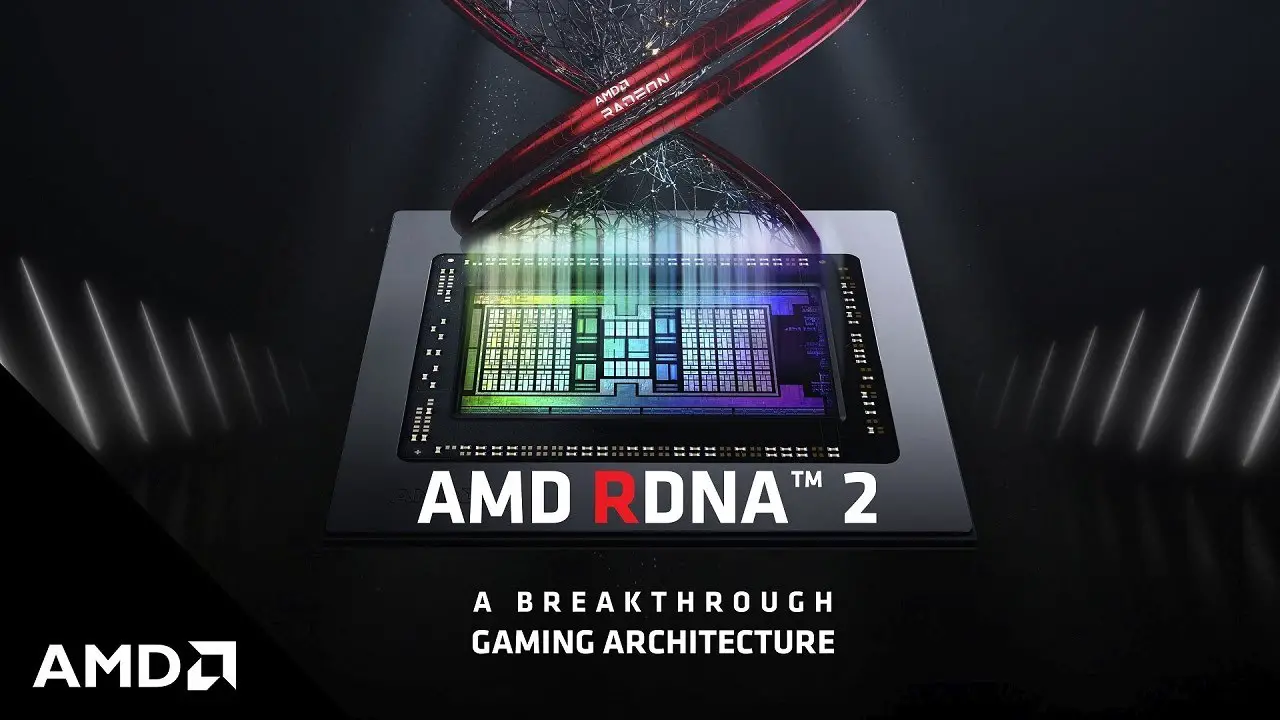
One of the biggest selling points of the Ryzen 7900X can be its integrated graphics processing unit which is absent on the 5900X. Usually, the Ryzen CPUs don’t come with any iGPU. This forces the users to buy a discrete GPU for getting a display signal on their monitors.
With the 7900X, it is totally possible to skip a discrete GPU if there is no graphically intensive requirement. The iGPU on the 7900X is based on RDNA 2 architecture and features 2 GPU cores and a boost clock speed of up to 2200MHz.
Note that it is significantly slower than the iGPUs found on Ryzen APUs and can’t be used for gaming. It is only sufficient for powering up a monitor but can support higher resolutions.
- Processor is versatile, reliable, and offers...
- Ryzen 9 product line processor for your...
- 5 nm process technology for reliable performance...
- Dodeca-core (12 Core) processor core allows...
Gaming And Non-Gaming Performance

To ensure healthy and fair competition, it is essential to compare these CPUs in gaming and professional applications. The benchmarks will tell us the real story and will help us decide on the best processor among the two.
While on paper, the 7900X is already faster than the 5900X, it is important to see how much performance boost you will be getting with the former. Then we can compare their values with respect to their original and current prices.
We are talking benchmarks from a few third-party sources like GamersNexus, Techspot((https://www.techspot.com/review/2538-amd-ryzen-7900x/)), Tomshardware((https://www.tomshardware.com/reviews/amd-ryzen-9-7900x-cpu-review)), and Guru3D((https://www.guru3d.com/articles-pages/amd-ryzen-9-7900x-processor-review,1.html)) to analyze the difference between the two. Comparing the two CPUs from a single source might give us inaccurate results but analyzing and comparing the benchmarks of a few sources will give us the whole picture.
According to GN, the average bump in performance with the 7900X is 11% if we compare the test results of 6 games with the RTX 3090 Ti. Guru3D also gets similar results with an average performance increase of 13.75% as tested in four different games. Tomshardware gets a 15% average performance difference across 7 games and Techspot gets 17% across 12 different games.
Therefore, the average difference between the 7900X and 5900X in gaming performance remains between 11% to 17% . As for the difference in performance in CPU-intensive applications, finding out the average gap is more difficult as CPU-dependent apps function differently and while some apps may like better single-core power, others prefer faster multi-core strength.
When we compare the two in real-world apps, the 7900X shows up to 35% lead in most applications , particularly apps that favor faster single-core performance like Adobe Premiere Pro and Photoshop. Rendering and compression/decompression apps also favor the 7900X much more than the 5900X with at least 20-30% lead.
Thermals
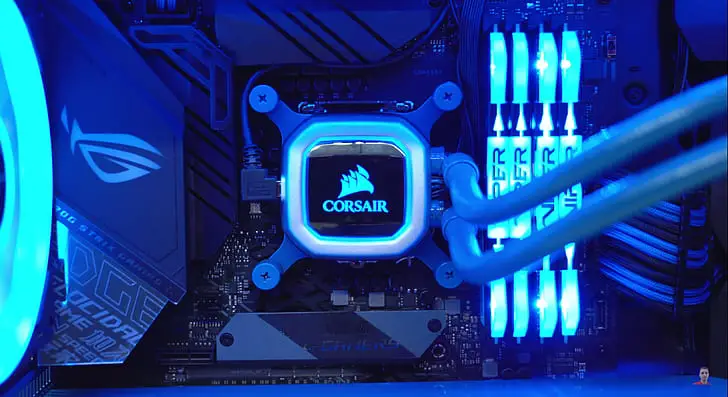
The thermal performance of the 7900X is terrible. Ryzen 7000 CPUs run very hot compared to the previous gen Ryzen CPUs including the 5900X as well as most Intel processors.
The 7900X can easily reach above 90 degrees Celcius even with an aftermarket CPU cooler and while it is indeed very hot, AMD still calls that “Normal”. The 7900X will require a better cooling solution like a 360mm AIO that can maintain its temps below 90C.
5900X doesn’t have any problems like that and can be cooled with a 240 or 280mm AIO without overheating. Most of the time, the 5900X will run under 70C or at least 80C even if overclocked but the 7900X will be always close to 90C despite the fact that AMD states the max. operating temperature of the 7900X as 95C which is just 5 degrees more than the 5900X.
Choosing The Best One
As of now, it is clear that the 7900X is superior in both gaming and CPU-intensive applications giving an average of 15% better performance in the former and around 30% in the latter.
Ryzen 5900X and 7900X were both launched at $549 initially but as time went on, the 5900X dropped significantly in price and is currently available for around $400 which is around a 37% cut in the price. Therefore, going just by the value, the 5900X looks like a better choice but there are other things to consider.
The overall cost of building a PC with the 7900X is going to be significantly costlier than building a PC with 5900X. The 5900X not only costs lower right now but overclockable chipset motherboards with the AM4 socket like the X570 and B550 are comparatively cheaper than the AM5 motherboards.
Also, the cost of DDR4 memories is still much lower than DDR5. On top of that, the 7900X will require a more expensive cooling solution than the 5900X. So, a price increase of $400-$500 is evident if you choose the 7900X right now.
Therefore, the 5900X is giving you a far better value than the 7900X. On the other hand, the 7900X gives you a better future-proof PC where you can upgrade to a better CPU in the next 3-4 years as AM5 should at least last for 5 years. Ryzen 5900X is already a top of the line Ryzen CPU for the AM4 platform and there is no good processor except for the 5950X you can upgrade to but that won’t give you any good bump in performance.
Over To You
I have compared both processors in detail and listed out the advantages of going with each processor. Therefore, all you need to do is consider all the points explained above and make your decision.
If you are looking for the fastest AMD-based build and better upgradeability, get the 7900X but if you are already using an older Ryzen processor from the first three generations, getting the 5900X will be a much wiser choice. Also, it is way cheaper than building a PC around the AM5 platform.
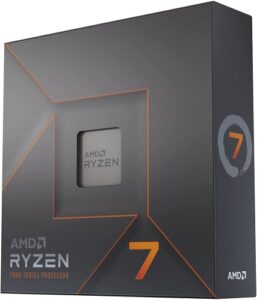
Reasons To Buy Ryzen 9 7900X
[wp-svg-icons icon=”thumbs-up” wrap=”i” color=green] AM5 will last longer
[wp-svg-icons icon=”thumbs-up” wrap=”i” color=green] RDNA 2 based iGPU
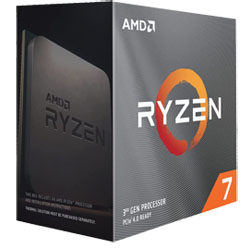
Reasons To Buy Ryzen 9 5900X
[wp-svg-icons icon=”thumbs-up” wrap=”i” color=green] Significantly lower PC cost
[wp-svg-icons icon=”thumbs-up” wrap=”i” color=green] Supports less expensive DDR4 RAM
Related:
- AMD Ryzen 5 7600X vs Ryzen 7 7700X
- AMD Ryzen 5 7600X vs Ryzen 5 5600X
- AMD Ryzen 5 7600X vs Intel Core i5 12600K
- AMD Ryzen 5 7600X vs Ryzen 7 5800X3D
- AMD Ryzen 7 7700X vs Ryzen 7 5800X3D
- AMD Ryzen 7 7700X vs Intel Core i7 12700K
- AMD Ryzen 7 7700X vs Ryzen 9 7900X
- AMD Ryzen 9 7900X vs Ryzen 9 7950X
- AMD Ryzen 9 7900X vs Intel Core i9 12900K
- AMD Ryzen 5 7600X vs Intel Core i9 12900K
- AMD Ryzen 7 7700X vs Ryzen 7 5700X
- AMD Ryzen 9 7950X vs Ryzen 9 5950X
- AMD Ryzen 7900X vs Core i7 13700K
